Daily Vocabulary Words: List of Daily Used Words in Leading International Newspapers
Hi there. Welcome to this special section @ Wordpandit.
Our endeavour here is very simple: to highlight important daily vocabulary words, which you would come across in leading newspapers in the country. We have included the following newspapers in our selection:
• The New York Times
• The Washington Post
• Scientific American
• BBC
• The Guardian
• Psychology Today
• Wall Street Journal
• The Economist
We are putting in extensive work for developing your vocabulary. All you have got to do is be regular with this section and check out this post on a daily basis. This is your repository of words that are commonly used and essentially, we are posting a list of daily used words. Hence, this has significant practical application as it teaches you words that are used commonly in leading publications mentioned above.
Visit the website daily to learn words from leading international newspapers.
WORD-1: Forthrightly
CONTEXT: Mr. Biden’s address performed a crucial civic service not only by channeling the public’s revulsion at a flagrant narcissist who won’t take no for an answer but also by forthrightly stating just what could happen to the United States if that narcissist wins again.
SOURCE: New York Times
EXPLANATORY PARAGRAPH: Imagine you’re playing a game, and your friend asks you if you cheated. Instead of trying to hide it or make excuses, you tell them honestly that you didn’t cheat. That’s being “forthrightly.” It’s when you speak or act in a direct and honest way, without hiding anything or being sneaky.
MEANING: Acting or speaking openly and directly, without hesitation or evasion (adverb).
PRONUNCIATION: fawr-THRAHYT-lee
SYNONYMS: honestly, openly, candidly, straightforwardly, truthfully
USAGE EXAMPLES:
1. She forthrightly admitted her mistake and apologized.
2. The politician spoke forthrightly about the issues facing the country.
3. He always deals forthrightly with difficult situations.
4. The teacher appreciated the student’s forthrightly response.
WORD-2: Indictment
CONTEXT: The impeachment clause of the Constitution provides that “the Party convicted shall nevertheless be liable and subject to Indictment, Trial, Judgment and Punishment, according to Law.”
SOURCE: Washington Post
EXPLANATORY PARAGRAPH: Imagine you’re playing a game with your friends, and someone breaks the rules. The other players notice and tell the game leader, who then decides what to do. That’s a bit like an “indictment.” It’s when someone is formally accused of doing something wrong, like breaking a law or a rule.
MEANING: A formal accusation or charge of wrongdoing, often by a legal authority (noun).
PRONUNCIATION: in-DAHYT-muhnt
SYNONYMS: accusation, charge, allegation, prosecution, complaint
USAGE EXAMPLES:
1. The grand jury handed down an indictment against the suspect.
2. The indictment listed multiple charges against the defendant.
3. The indictment was a serious blow to his reputation.
4. The company faced an indictment for violating environmental regulations.
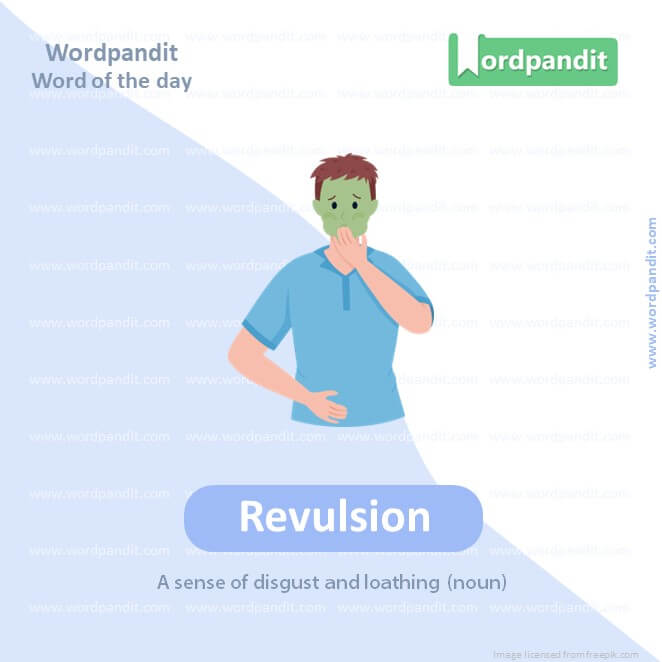
WORD-3: Revulsion
CONTEXT: Mr. Biden’s address performed a crucial civic service not only by channeling the public’s revulsion at a flagrant narcissist who won’t take no for an answer but also by forthrightly stating just what could happen to the United States if that narcissist wins again.
SOURCE: New York Times
EXPLANATORY PARAGRAPH: Imagine you accidentally bite into a sandwich and taste something gross, like moldy cheese. Your face scrunches up, and you quickly spit it out because it tastes so bad. That feeling of disgust and wanting to get away from something unpleasant is “revulsion.” It’s when you feel strong disgust or intense dislike towards something.
MEANING: A sense of disgust and loathing (noun).
PRONUNCIATION: ri-VUHL-shuhn
SYNONYMS: disgust, repugnance, abhorrence, loathing, aversion
USAGE EXAMPLES:
1. The revulsion on her face was evident when she saw the cockroach.
2. He couldn’t hide his revulsion at the sight of the gruesome scene.
3. The revulsion towards the dictator’s actions grew among the citizens.
4. The revulsion towards injustice fueled their activism.
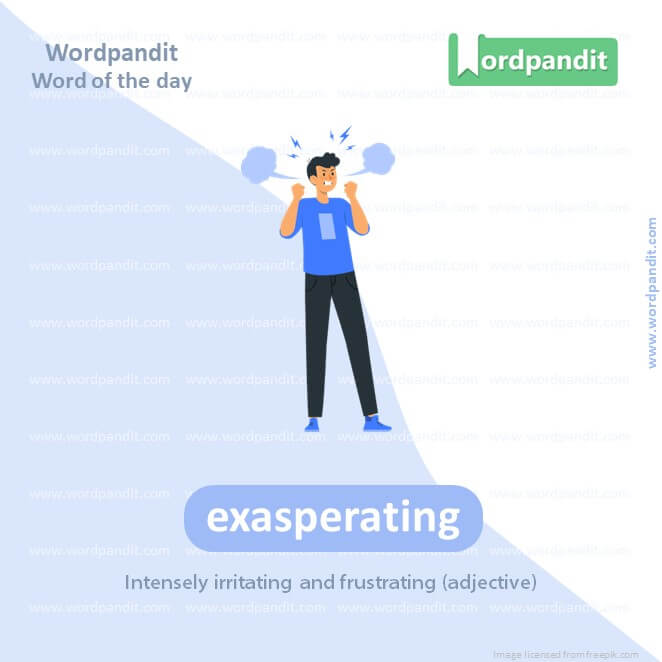
WORD-4: Exasperating
CONTEXT: the exasperating reality along with a majority of the country, struggles to cope with as we enter an election year unlike any in American history.
SOURCE: New York Times
EXPLANATORY PARAGRAPH: Imagine you’re trying to build a tower with blocks, but every time you stack them up, they keep falling down. You try again and again, but it just won’t stay up. That feeling of frustration and annoyance you get is “exasperating.” It’s when something is so annoying or irritating that it makes you want to scream.
MEANING: Intensely irritating and frustrating (adjective).
PRONUNCIATION: ig-ZAS-puh-rey-ting
SYNONYMS: irritating, annoying, vexing, aggravating, maddening
USAGE EXAMPLES:
1. His exasperating habit of tapping his pen during meetings drove everyone crazy.
2. Dealing with the never-ending paperwork was exasperating.
3. She found it exasperating when people were late for appointments.
4. The exasperating traffic made them late for the movie.
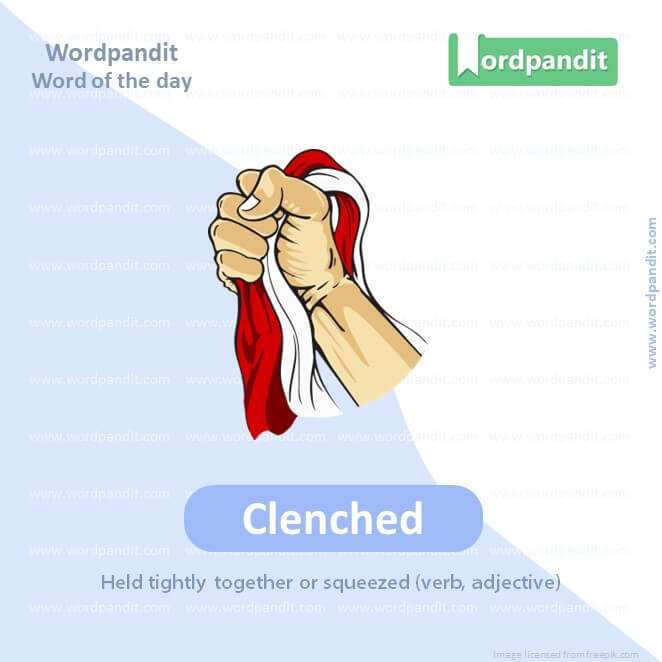
WORD-5: Clenched
CONTEXT: it was this brief, unfinished aside — off-script, sandwiched around an extended silence during which the president clenched his fists in an effort to resist uttering the curse behind his teeth.
SOURCE: New York Times
EXPLANATORY PARAGRAPH: Imagine you’re really mad or scared, and your fists tighten up so much that your knuckles turn white. That’s what “clenched” means. It’s when you close your hands tightly because of strong emotions, like anger, fear, or determination.
MEANING: Held tightly together or squeezed (verb, adjective).
PRONUNCIATION: klencht
SYNONYMS: tightened, compressed, squeezed, gripped, clasped
USAGE EXAMPLES:
1. Her jaw was clenched tightly as she listened to the bad news.
2. He clenched his fists in frustration.
3. The dog’s teeth were clenched around the bone.
4. She felt her stomach muscles clenched with anxiety.
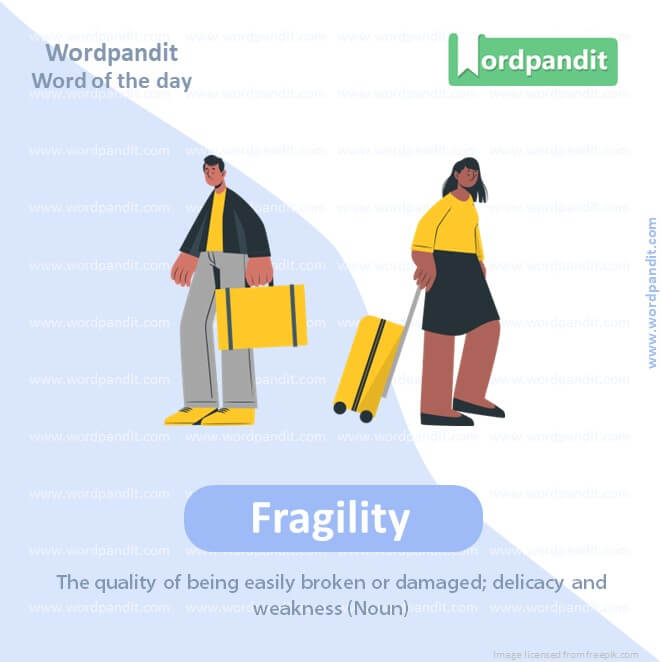
WORD-6: Fragility
CONTEXT: President Biden offered many eloquent turns of phrase on the importance and the fragility of democracy in his well-crafted campaign kickoff speech on Friday near Valley Forge, Pa.
SOURCE: New York Times
EXPLANATORY PARAGRAPH: Imagine you’re holding a delicate glass ornament in your hands. You know that if you drop it, it will break into tiny pieces. That’s what “fragility” is like. It’s when something is very delicate and easily broken or damaged, like a flower petal or a soap bubble.
MEANING: The quality of being easily broken or damaged; delicacy and weakness (Noun).
PRONUNCIATION: fruh-JIL-i-tee
SYNONYMS: delicacy, vulnerability, brittleness, frailty, weakness
USAGE EXAMPLES:
1. The fragility of the antique vase made her nervous to handle it.
2. The fragility of his emotions was evident in his teary eyes.
3. She handled the fragile package with extreme care because of its fragility.
4. The fragility of the ecosystem was a concern for environmentalists.
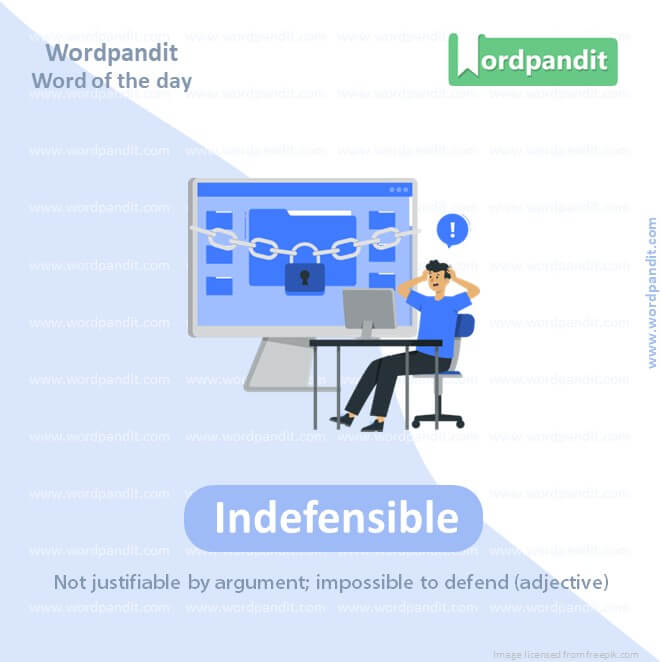
WORD-7: Indefensible
CONTEXT: Whatever the wisdom of Mayorkas’s policy decisions, the claim that he should be impeached is indefensible as a matter of constitutional law.
SOURCE: Washington Post
EXPLANATORY PARAGRAPH: Imagine you’re playing a game, and someone cheats in a really obvious way. Everyone knows they cheated, and they can’t even come up with a good excuse. That’s what “indefensible” means. It’s when something is so obviously wrong or bad that it can’t be justified or explained.
MEANING: Not justifiable by argument; impossible to defend (adjective).
PRONUNCIATION: in-di-FEN-suh-buhl
SYNONYMS: unjustifiable, untenable, inexcusable, unpardonable, insupportable
USAGE EXAMPLES:
1. His actions were indefensible, and he was quickly removed from the team.
2. The decision to cut funding for education was indefensible.
3. The lawyer argued that the defendant’s actions were indefensible.
4. The company’s treatment of its workers was indefensible.
WORD-8: Objectionable
CONTEXT: No official who maintained the president’s support has ever been impeached for carrying out policy in ways the House found objectionable.
SOURCE: Washington Post
EXPLANATORY PARAGRAPH: Imagine someone says something mean or rude to you, and it makes you feel really upset or uncomfortable. That’s what “objectionable” means. It’s when something is offensive or unpleasant and makes you want to speak out against it or avoid it altogether.
MEANING: Arousing disapproval or dislike; offensive or unpleasant (adjective).
PRONUNCIATION: uhb-JEK-shuh-nuh-buhl
SYNONYMS: offensive, disagreeable, unacceptable, distasteful, repugnant
USAGE EXAMPLES:
1. The movie contained objectionable content that some viewers found offensive.
2. His jokes were often objectionable and made people uncomfortable.
3. She found the language used in the book objectionable.
4. The company’s policies were deemed objectionable by many employees.
WORD-9: Egregious
CONTEXT: The framers rejected that vision. For impeachments of “the President, Vice President and all civil Officers of the United States,” they instead required proof of egregious malfeasance:
SOURCE: Washington Post
EXPLANATORY PARAGRAPH: Imagine someone does something really, really bad, like stealing from a charity or lying under oath in court. That’s what “egregious” means. It’s when something is shockingly bad or offensive, like breaking a major rule or law.
MEANING: Outstandingly bad or shocking; flagrant (adjective).
PRONUNCIATION: ih-GREE-juhs
SYNONYMS: flagrant, blatant, outrageous, heinous, atrocious
USAGE EXAMPLES:
1. The CEO’s egregious actions led to the downfall of the company.
2. The senator’s egregious behavior scandalized the entire nation.
3. The teacher was shocked by the student’s egregious disrespect.
4. The company was fined for its egregious violations of environmental regulations.
WORD-10: Illuminating
CONTEXT: The rule that we do not impeach over policy disagreements has had its strongest expression in disputes over immigration enforcement. There are two illuminating precedents.
SOURCE: Washington Post
EXPLANATORY PARAGRAPH: Imagine you’re in a dark room, and someone turns on a bright light. Suddenly, you can see everything clearly, like the colors of the walls and the furniture around you. That’s what “illuminating” means. It’s when something sheds light on or clarifies something that was previously unclear or unknown.
MEANING: Providing insight, clarity, or understanding; enlightening (adjective).
PRONUNCIATION: ih-LOO-muh-ney-ting
SYNONYMS: enlightening, clarifying, revealing, elucidating, enlightening
USAGE EXAMPLES:
1. The documentary provided an illuminating look into the lives of endangered species.
2. Her explanation was illuminating and helped everyone understand the concept.
3. The book offered an illuminating perspective on historical events.
4. The professor’s lectures were always illuminating and engaging.
Vocabulary Spelling
In the rich tapestry of language learning, getting the ‘vocabulary spelling’ right forms a significant thread. These spelled words or the arrangement of letters give each word its unique identity. However, understanding ‘vocabulary spelling’ proficiently needs an insightful and strategic approach.
Starting the journey of learning ‘vocabulary spelling’, one must focus on observing patterns. English language words often follow certain spelling rules or patterns. Recognizing these can simplify the learning process, offering a systematic way to appreciate ‘vocabulary spelling’.
The trick to ingraining ‘vocabulary spelling’ effectively lies in the power of repetition. Regularly writing words can help reinforce the spelling in your memory. To boost this, tools like spelling quizzes or flashcards with the word on one side and the spelling on the other can provide an engaging way to practice ‘vocabulary spelling’.
An unconventional yet powerful approach to remember ‘vocabulary spelling’ is by using mnemonic devices. For instance, connecting the word’s spelling with a catchy phrase or rhyming pattern can make recall easier.
Integrating technology with learning ‘vocabulary spelling’ has its unique benefits, too. Apps offer various exercises and tests that not only enhance memory but also make learning fun.
Importantly, the learning of ‘vocabulary spelling’ should be punctuated with regular revisions. This ensures the recalled spelling is correct and cements it in your long-term memory.
In a nutshell, mastering ‘vocabulary spelling’ requires keen observation, regular practice, innovative mnemonic tools, use of technology, and timely revisions. As you follow this comprehensive path, you strengthen your grasp over ‘vocabulary spelling’, paving the way to language proficiency. Remember, every word spelled correctly is a moment of triumph in the enthralling escapade of language learning!







